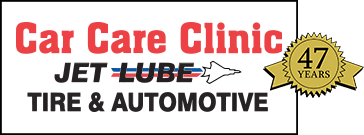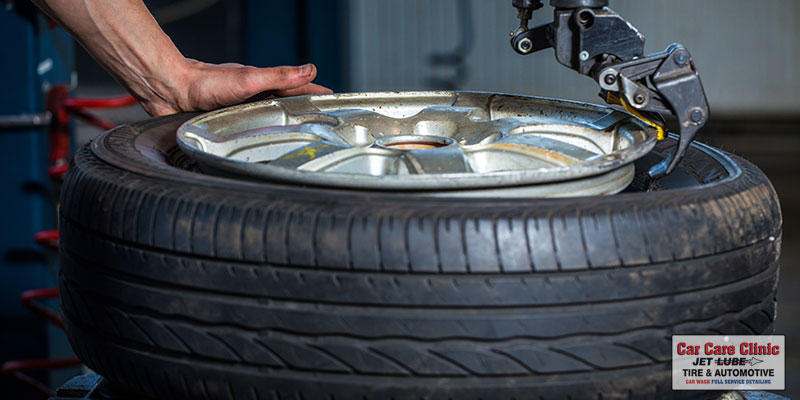Tire Rotation Service
Tire Rotation Can Help Prevent Premature Tire Wear
Tires do a lot of work: They transfer engine power and braking forces to the road; they handle steering control; and they cushion all those bumps and jolts. They also support the entire weight of the vehicle, including you and your passengers. With such critical work to do, you want your tires to do their job well. Little things like having proper air pressure can even save you in gas mileage. And since replacing tires is fairly expensive, you want them to last as long as possible.
There are three keys to long even tire wear:
- Proper tire inflation
- Proper wheel alignment
- Regular tire rotation and balancing
Front Tires Carry The Bulk Of The Load And Wear Faster Than Rear Tires
The front tires on a car take the brunt of the steering forces. As they push through turns, the shoulders of the front tires wear down more quickly than the rear tires. Rotating front and rear tires allows them to all wear at about the same rate. That’s especially true of front wheel drive vehicles whose front tires steer, and put the power to the road.
SUV And Truck Tires Tend To Wear Unevenly
SUVs and pick-ups, especially four wheel drives, also tend to wear their tires more unevenly than cars because of their suspension and drive train set-up. Your owner’s manual will likely contain a schedule for tire rotation. It’s usually every 5,000 miles or so.
Tire Rotation Patterns Vary By Vehicle
Also, there are different rotation patterns for different vehicles. Your service center will know which is right for your vehicle. That brings us to wheel balancing. When wheels are balanced, they spin on the axle evenly. When they are out of balance, they wobble a bit. That makes the tires wear unevenly and may transmit a vibration to the car. Your service technician puts weights on your wheels to balance them out so that they turn true and smooth.
Tire Rotation Is An Important Step To Maintain Vehicle Safety
Tires are a big investment for any vehicle. They’re critical for keeping you safely on the road. The cost for regular rotation and balancing is more than made up in extended tire life. And, can you really put a price on your safety and that of your passengers?
What is the service?
Changing the position of the tires on your vehicle, according to your vehicle and tire manufacturers’ recommended rotation pattern.
The main reason to rotate your tires is to prevent unsafe driving conditons caused by uneven tire wear and to maximize the life of your tires. In front-wheel drive vehicles, the front tires carry over 60 percent of the car’s weight, transfer engine power to the road and account for about 80 percent of the braking force. Inevitably, front and rear tires will wear unevenly, so by rotating your tires around your vehicle, the tires will wear more evenly and last longer.
Car Care Clinic’s Tire Rotation service follows the recommendations from you vehicle’s manufacturer on how often and in what sequence to rotate your tires. A standard rule of thumb is to rotate tires every 6,000 miles to maintain uniform tire wear and help avoid dangerous situations caused by poor traction or tire failure.
Benefits of Tire Rotation:
- Helps avoid dangerous situations caused by poor traction and tire failure
- Helps promote a more even & uniform tread-wear pattern for all 4 tires
- Recommended every 6,000 miles or following manufacturer’s recommendations
Nitrogen Tire Inflation Service (Select Locations)
Tire pressure is an important factor for both fuel economy and driving safety. Unfortunately, most people don’t think to check their tire pressure unless their tires are visibly low. In many cases, 5-to-10 pound differences in tire pressure are barely noticeable, so you could be driving on low tire pressure and not even know it. So why use Nitrogen for your automotive tires? The air we breathe is made up of Nitrogen (78 percent), Oxygen (21 percent) and small amounts of water vapor and other gasses (1 percent). Nitrogen is the largest molecule in air so it doesn’t escape from your tires as easily as Oxygen or water vapor. Oxygen escapes up to four times faster and water vapor escapes up to 250 times faster, then Nitrogen alone.
During each Nitrogen Tire Service we pump out all of the old air and inflate your tires with Nitrogen. Your Nitrogen-filled tires will retain their proper inflation up to four times (4x) longer than traditional tire inflation methods. The result is better fuel economy, longer tread life and increased safety. The Nitrogen also minimizes the water vapor inside your tires so steel wheels are less likely to rust on the inside.
Benefits of the Nitrogen Tire Service:
- Nitrogen filled tires remain at proper inflation up to four times (4x) longer
- Helps improve fuel economy by reducing rolling resistance
- Helps reduce tire tread wear caused by improper tire inflation
- Improves vehicle safety: 90 percent of tire blowouts are caused by under-inflated tires



